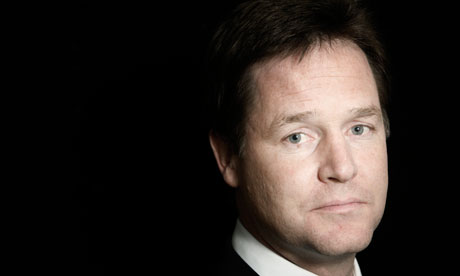Nick Clegg turns fire on David Cameron over Europe veto
![]()
Liberal Democrat leader ‘furious at prime minister’s tactics’ as Paddy Ashdown voices fears over isolation
Deputy prime minister Nick Clegg is no longer prepared to take the hits for the coalition on policies he does not agree with. Photograph: Gary Calton for the Observer
Nick Clegg and senior Liberal Democrats have turned dramatically on David Cameron over Europe, accusing the prime minister of endangering the interests of the British economy.
Just 24 hours after appearing to back Cameron, sources close to Clegg made clear that the deputy prime minister believed the PM had been guilty of serious negotiating failures that risked damaging the national interest, British jobs and economic growth.
Clegg’s fury puts the coalition under the most severe strain since its formation 19 months ago, with Europe now seen by some MPs as a potential “deal breaker”.
One source said Clegg “couldn’t believe it” when he was woken at 4am in his flat in Sheffield to be told that talks on how to save the euro at the Brussels summit had “spectacularly unravelled”.
Accusing Cameron of failing to play the diplomatic game effectively, the source added: “He could not believe that Cameron hadn’t tried to play for more time. A menu of choices wasn’t deployed as a negotiating tool but instead was presented as a take it or leave it ultimatum. That is not how he [Clegg] would have played Britain’s hand.”
The source said Clegg feared Britain would now be the “lonely man of Europe”, with less influence, not more, for the City of London, less influence with the US and less foreign investment. “It leaves us isolated in Europe and that is not in the national interest.”
The stinging rebukes reflect Clegg’s recognition that he can no longer take the hits for the coalition and defend policies with which he disagrees. Instead, he has criticised Cameron in a way that will raise questions about the government’s ability to last its five-year term.
Cameron refused to sign up to a revision to the Lisbon Treaty in the early hours of Friday – during a summit to save the euro – because other EU leaders would not agree to safeguards he demanded for the City and the single market. A spokeswoman for Cameron, who will address MPs in the Commons on Monday, said the outcome, which left the UK as the only one of the 27 EU nations not signing the accord, was “not ideal, but the best we could get”.
She added: “We are isolated on this but on this issue it is right to be isolated.” A senior Lib Dem minister said he was very angry that Cameron had put “the interests of the City above manufacturing and real jobs”.
On Friday Clegg had come under heavy criticism from fellow Liberal Democrats for appearing to back the prime minister. After the summit he said Cameron’s demands had been “modest and reasonable”. It is understood that he later concluded that, politically, he could not be seen backing a deal that Lib Dems regard as having been forced by a group of hardline Eurosceptics.
Other Lib Dems came out to condemn what had been agreed in Brussels in the name of the coalition. Former Liberal Democrat leader Paddy Ashdown, writing in the Observer, said the coalition “must” survive in the national interest. But he said the damage had been enormous. “At a time of economic crisis, it is now more attractive for investors to go to northern France than to isolated Britain. We have tipped 38 years of British foreign policy down the drain in a single night. We have handed the referendum agenda to the Eurosceptics. We have strengthened the arguments of those who would break the union. We have diminished ourselves in Washington.”
The Lib Dem peer Shirley Williams was equally robust. “It will diminish our influence far beyond Europe, in Washington, Beijing and New Delhi, capitals that value the influence they believe we have in Brussels.”
Another Lib Dem peer Lord Oakeshott said Lib Dems would try to force Cameron back to Brussels to mend the damage. “Many of us were shocked and stunned on Friday. But we are now finding our voice. Nick Clegg and our Liberal Democrat leaders must force Cameron back to the negotiating table to fight for our vital interests in Europe, not leave an empty chair and Britain isolated, impotent and ignored.”
Labour claimed that the UK government had deliberately tried to wreck the summit by tabling a protocol the day before demanding that single market rules no longer be subject to majority voting but open to a national veto. Labour suggested Cameron had sought to torpedo the summit. Downing Street denied this.
Shadow foreign secretary Douglas Alexander said the root of the “fateful decision” lay in Cameron’s concessions to Eurosceptics during his leadership campaign in 2005, when he promised to pull the Tories out of the centre-right grouping, the European People’s Party. “Ever since, he has been following his party, not leading his party on Europe.”
John Kerr, the former UK permanent representative to the EU, said that even under Margaret Thatcher the country had been at the heart of negotiations over Europe. He said: “I am very puzzled that we chose to pick up the ball and leave the pitch before the game started. I’m very uneasy because I’m very worried about the empty chair.”
Related Articles
‘Yes,’ ‘No’ in dead heat ahead of Turkish referendum
![]()
‘Yes,’ ‘No’ in dead heat ahead of Turkish referendum DHA photos ?ZG? GÜNGÖR ANKARA – Hürriyet Daily News The
IRELAND: National Demonstration On The Housing Crisis
![]()
The National Homeless and Housing Coalition have called a national demonstration on the housing crisis to take place on Saturday
Petraeus: Place Combat Posts as Close to Afghan Civilians as Possible
![]()
New Guidelines Admonish Troops to Be ‘Good Guests’New Afghanistan commander Gen. David Petraeus issued a new three page document outlining



